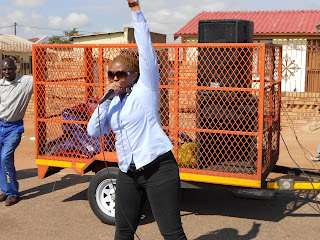 |
| Letang Tlome performing at Soshanguve Block H, outside Pretoria |
Alfred Makhubela
Sometimes in life you have to do something that will represent you as an individual that’s according to former Coca-cola pop star contender Letang Tlome.
Letang Tlome was part of the pop group Adillah which consisted of members such as Karabo Motlhabi, Thembisile Ntaka, Itumeleng Kgosana and Refiloe Motha. The group lasted until 2008 and reached the top five in the 2003’s edition of Coca-cola pop stars which aired on SABC 1.
 |
| Letang Tlome performing at Soshanguve Block H, outside Pretoria |
Tlome said that Adillah as a group did not give her the platform to do the kind of music she always wanted. “Adillah was a pop group and we had to do songs and subjects which were chosen for us” she said.
The 32 year old studied music and drama at the National School of the Arts. Her genre is Afro-Soul she focuses on subject matters such love and life experiences because she feels they relate with her.
Born in Soshanguve Letang is adamant that going solo will be a journey to higher places. “My dream has always been a super star like my favourite artists, the likes of Swazi Dlamini and Judith Sephuma”, she exclaimed.
She is currently working on her debut album titled Journey of my soul which is scheduled to be released this winter. The album is produced by Zakhele Mabena. “Fans can expect fun and love of any kind on my upcoming album”, she added.
Letang Tlome is a SAMA award winner with her group Adillah in 2004 for Best Newcomer with their debut album Ses’fikile which sold 40 000 copies.
